Grimm Interviews: Russell Hornsby & Silas Weir Mitchell
Two of the stars of Grimm, which kicks off in the UK on Monday 13 February on Watch, talk exclusively to SFX
Two of the stars of Grimm , which kicks off in the UK on Monday 13 February on Watch, talk exclusively to SFX
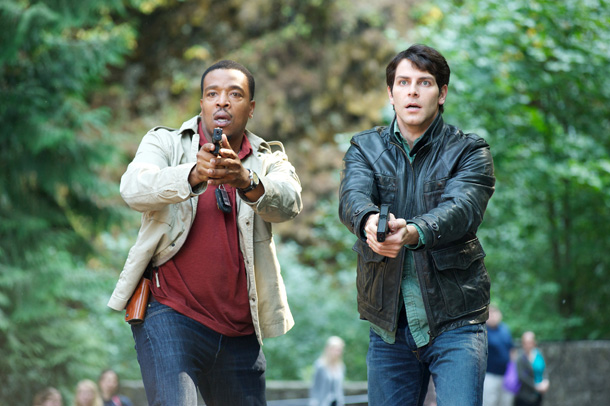
In case you hadn’t noticed, fairytales are big in Hollywood at the moment. We’ve got not one, but two versions of Snow White hitting the big screen this year ( Mirror, Mirror and Snow White And The Hunstman ) and Jack The Giant Killer is in production, while on the small screen we already have Once Upon A Time , while there are two versions of Beauty And The Beast in development.
At the vanguard of this new wave of screen fantasy, though, is Grimm , which has already proven a big hit on NBC in the States, and begins here in the UK on Monday on Watch. But don’t expect anything twee or cute about this take on fairy tales.
Grimm is a genre hybrid: it’s primarily a hard-bitten police procedural that just happens to involve creatures inspired by Grimms’ Fairy Tales . It stars David Guintoli as Nick Burkhardt, a cop who discovers he is a “Grimm” and can see these creatures (and we’ll have an interview with him on the site next week). Here, though, we chat to two of the show’s impressive cast of supporting characters.
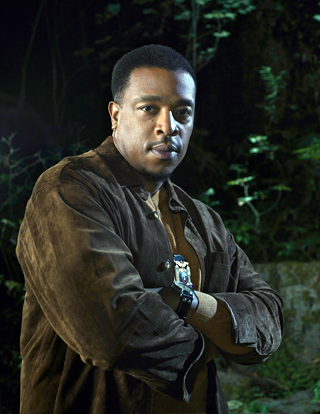
Russell Hornsby:
Hank Griffin
SFX : Why are fairy tales so big in Hollywood at the moment?
Russell Hornsby: “First and foremost, the rights are free. [Laughs] Also, I think it’s the times. It gives people the opportunity to people to dream; to wish upon a star again. I think that’s where we are now. In light of the economy and everything else, people want to escape, they want to be told a good story. We don’t want to deal with reality, it’s not much fun. They want to hear a song and want to dream.”
What can you tell us about your character?
Weekly digests, tales from the communities you love, and more
“My character is Hank Griffin. I’m a detective in the police department and I’m partner to Nick Burkhardt played by David Guintoli, who is the series lead. We’re basically partners, detectives trying to solve the murder mystery of the week.
“He is not part of the fantasy world. My character is based in reality; he is part of the procedural, dramatic aspect and knows nothing about these creatures. Nick and another character, Monroe, played by Silas Mitchell, they are a part of the fantasy, fairytale aspect of the world. And what the show’s creators have done is marry these worlds together. Hank doesn’t know anything about Nick’s powers of perception. He just knows that he’s a good police officer and we work well together.”
Hank isn’t the first police officer you’ve played. You were Eddie Sutton in Lincoln Heights for a long while. Do you like playing cops?
“I do enjoy playing cops. I enjoy playing people of authority. There is something for me about being a man of colour donning a badge. I don’t mean that I love the power of authority, as that’s flippant, but I love the respect of authority. Does that make sense?”
How much of Hank was there in the pilot script and how much did you have to flesh out?
“I think what happens is the writers write the character with a certain voice that you have to find in order to get the job. But from then, there has to be another voice that you find in order to make the part your own. In order to make it real. I mean, they write the character one way, then Russell Hornsby comes in and I cannot deny who I am. We cannot deny that I am African American; that I was born and raised in Oakland California. I do bring in a certain amount of soul, and, if you will, rhythm. You understand what I’m saying? I can come in and put a little hot sauce on the character and I think that’s what endears the audience to him.”
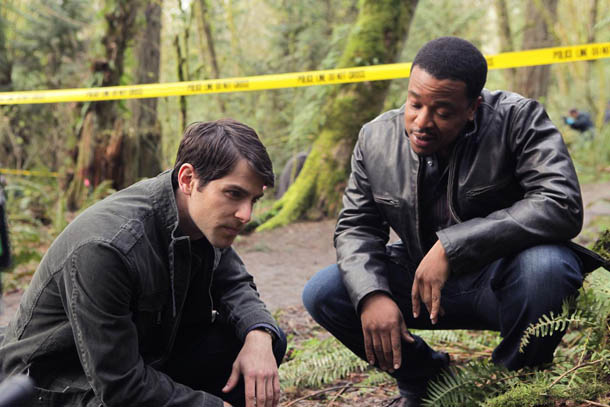
Do you remember your reaction when you first heard about the premise of the show?
“To be very honest with you, first and foremost, you’re happy to have a job. So once you get over the fact that you have a job then you have to look at job itself and you’re asking yourself, ‘Will this show work? How will it work?’ You know? And you look and you realise the network is taking a giant leap out on the edge of the ledge to put this show on the air, and it can either do very well or fail tremendously. I think there is no middle ground. The truth is, audiences are so sophisticated nowadays, you know? And they can read between the lines very well and they know when you’re trying to pass off something that’s not up to standard. They automatically say, ‘What are you going to do to get by me this week?’”
Is there a danger playing someone like Hank – who isn’t in on the show’s central secret – that he could end up coming across as a little bit stupid?
“I think it could be a danger, but this is where the writers and the producers come in. This is when their job has to be done well. I think they’ve done a really good job of detracting from that. It’s not the Lois Lane/Superman thing of ‘Where have you been? You missed the man who fell off the ledge and Superman saved him! Where were you been, Clark?’ You know what I mean? It’s not that kind of thing. It’s very methodical and very thought out. It’s very smart, and actually encourages the audience to get interested in trying to work out if Hank is going to find out.
“I have to give credit to our writers and creators, Jim Kouf and David Greenwalt. These men have 60 years of experience between the two of them. They know where the landmines are and they know how to bury them.”
It looks like you’re having fun on the show.
“I’m having a ball! I get an opportunity to be myself and to put a little humour in the mix – not to be so dry and serious all the time. To have a little bit of a swagger and dress nicely, and that’s fun. It’s a lot of fun.”
Is your “look” on the show important, then?
“I’m a clothes whore myself, so I care about the look. We have gone through a few generations of the look. I did a nod to Luther , I loved that show – both seasons. It was smart but simple with its use of coats and whatnot. So I told them here, ‘Give me some coats, some cashmere.’ He’s a mature man, he’s going take pride in his look.”
For the first part of the season at least we don’t learn much about Hank’s private life. Do you know his back story?
“I have an idea in my head, and what I’ve learned as an actor is to keep it to myself, not to ask the writers or producers. What they have shared with me , is my character was married and divorced four times to a variety of accomplished women: doctors, lawyers, anthropologists, things of that nature. So I’ve learned a lot from various different women, which is the case with a lot of men. We are judged by the company we keep.
“Other things are coming down the pipe for my back story: where I live, my home life, what I do when I’m off, all those things. But again we have to build the nucleus and the foundations first, which right now is about Nick and his character and his world. I think what will keep the audience engaged is when we delve into the lives of the secondary characters.”
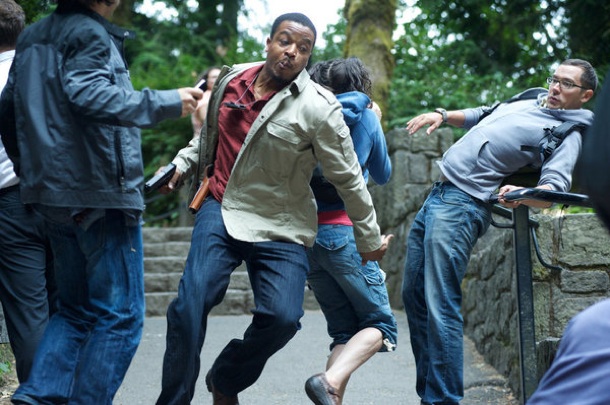
What’s the most extreme thing you’ve had to do on this show that you’ve never done before?
“Wow, you know there hasn’t really been much. There’s been a few chases where we leap between buildings in a single bound and I realise that I’m too old for that. I sort of thought that I was Ethan Hut for a minute and I wasn’t prepared. But that’s about it. Really I’m there for the charm and wit; all the guest stars and the creatures get to do all the fun, cool stuff.”
Before you started the show did you know much about Grimms’ Fairytales?
“No more than what we saw through Disney. There are over 220 fairytales and I knew maybe 20 of them before. Just the famous popular ones. But then I read some of the obscure ones and I realise why I don’t know them – some of them aren’t very engaging.”
It seems all telefantasy shows these days have to have a musical episode if they go on long enough. Can you sing?
“I can hold a tune! We’ve been talking about that because we do have very talented singers on our cast and crew. And every show I’ve been on I’ve wanted to do a musical episodes so hopefully we’re on for a couple of years we can do a musical episode. I would totally enjoy that.”
Grimm is doing well in the ratings in the US isn’t it?
“Yeah, I think we’ve got a cult hit on our hands. I hope you guys like it.”
Silas Weir Mitchell interview on the next page
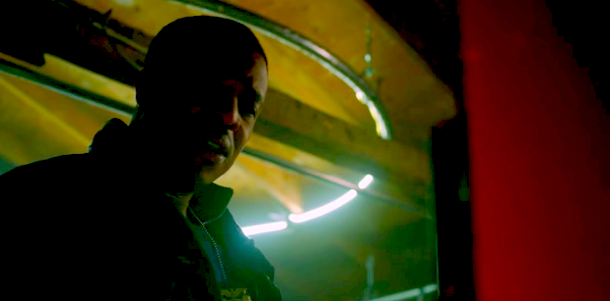
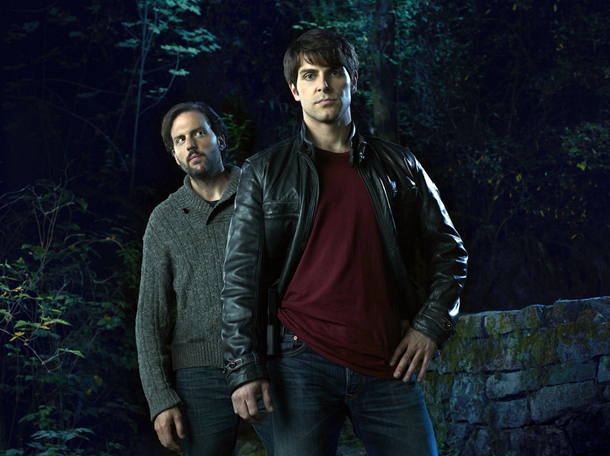
Silas Weir Mitchell: Monroe
SFX : Who or what is Monroe, and how does he fit into the crazy world of Grimm?
“The most concise explanation is that Nick and Monroe and both fish out of water. He’s just discovered what he is, and I’m out of the water because I am trying to disavow what I am. And when Nick discovers that I am one of these creatures that he is now able to see, he assumes I am one way, and I turn out to be a different way. In other words, I am reformed creature.
“And that wrinkle creates an opening where, although we should be natural enemies, we might not come to blows in the same way that they would if I were a regular creature. I am trying to live my life as a normal, human, vegetarian clock maker. I haven’t been out in the world much lately. I’ve been doing my Pilates and eating my tofu and keeping it all together.”
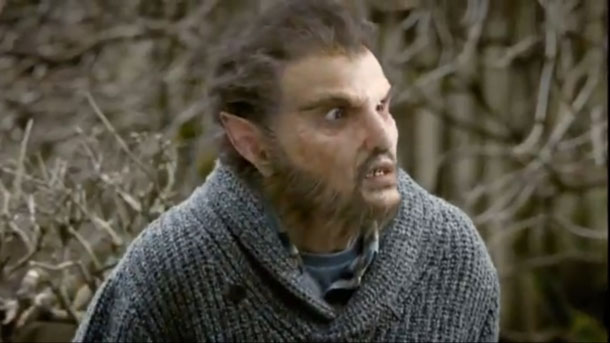
You are a kind of werewolf creature called a Wieder Blutbad, which you are occasionally seen to change into. Is that done purely by CG or are prosthetics involved?
“It is a combination of the two, exactly. And in the earlier episodes, they were still finding their footing. Particularly I think in the second episode. CGI versus pure prosthetics versus a combo: these balls were still being juggled at that point. They came down on the side of a combination of physical elements and digital elements blended together.
“The look of the Blutbad has subtly shifted. On the way there, it went though various kinds of stages. And what we’ve arrived at I think is a very good combination. It looks still like me. Like my Blutbat. And you will be seeing other blutbads, and you’ll see that their creatures are uniquely them too. Still Blutbad, but them.”
What appealed to you about the role?
“The inner conflict. I mean drama is about conflict and inner conflict is inherently interesting. So the idea of a being whose very identity constantly hangs in the balance, I find very interesting. I think there is a potential there for it to be very intense. There is a levity to the show, and there’s also the procedural element. A crime is solved every week, and a criminal is caught every week. So there is a rhythm to the show. But I certainly think there is room for the darker elements of the human animal – the human psyche – to be played upon.
“Because really I think what we’re dealing with are creatures – on a psychological level – that people who are unable to withstand their darker impulses. And when a Grimm sees a creature, what they’re seeing is a creature who’s out of control. And whatever they are – some of us might be a mouse, some of might be a lion – underneath the human mask lies this dark element.”
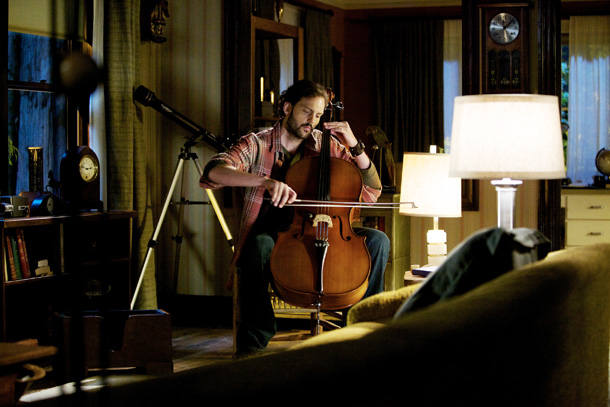
You have a long list of credits as guest characters on US TV shows – including Prison Break , My Name Is Earl , The Shield , The Mentalist – so is this kind of fantasy a new area for you?
“In the States we call it a genre show. Genre show? I’ve never understood what that means really, because that’s like saying… it’s a cookie cookie. Or a biscuit biscuit. It doesn’t mean anything.
“The point is, in these shows you are allowed to play more broadly with the human psyche than in a show where you’re bound to reality. I like that.”
How did you react to the line in the pilot script where it says, “Nick finds Monroe marking his territory”?
“Oh, I thought that was brilliant. I love it. The writers have a real dark, dour humour and I think it’s fantastic. It runs through the show in a very positive way, this kind of offbeat humour. And I think in a lot of way Monroe embodies that.”
Why do you think fairy tales are so big in Hollywood at the moment?
“My stock answer is, when things aren’t great and there’s turmoil, when times are troubled, people look inward. And inward-looking involves mythology. And I think basically these things are myths and myths are an attempt of the human creature to teach itself about itself, by telling itself stories about itself. It’s a very reflexive exercise. And fairy tales are myths. They clothe a lesson. And in times like this it’s more appealing for people to explore those things though fantasy and imagination, because gritty and realistic is there every day.
“Well, that’s my stock answer. Honestly, on the other hand, that’s just the way it goes in Hollywood. One years there’s 12 pilots about substitute teachers, the next years there’s 12 pilots about construction workers.”
Do you feel any rivalry with Once Upon A Time ?
“Only at the very beginning when we saw that both pilots were being made. We were like, ‘Okay, so what’s their deal?’
“We really quickly surmised that there was no connection, really, whatsoever – aesthetically or narratively – between us. It’s two blind men touching the elephant. We’re mining fairy tales from completely different angles. Our show has a great many elements to it. The cop thing. The buddy thing. The romantic thing with Nick and his girlfriend. A procedural. And a kind of an x-factor of something we haven’t seen before. You’ve gotta kinda leaven the new with the expected. If you can seed the expected with the novel then you’re in good shape.”
Is it a pain sometimes being Mr Exposition?
“No, no, no. That’s the challenge and the fun of it. I am Nick’s window on this world, right? So despite the fact that we’re natural enemies and at any moment I might rip his face off, I am his avenue into this brand new world. And as far as I am concerned as an actor, that means my job is to know this world at least as well as Monroe knows it. And that’s a delight as an actor because your imagination is being pushed into an arena that’s new to it.”
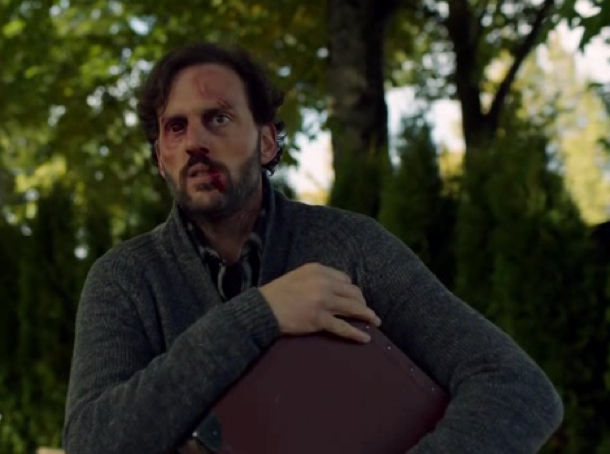
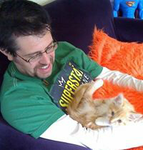
Dave is a TV and film journalist who specializes in the science fiction and fantasy genres. He's written books about film posters and post-apocalypses, alongside writing for SFX Magazine for many years.


